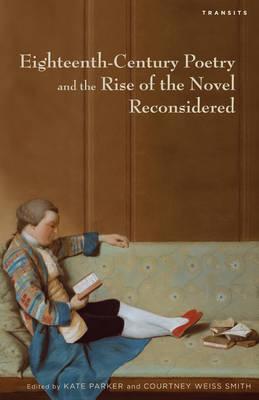Full Product Details
Author: Kate Parker ,
Courtney Weiss Smith ,
Margaret Doody ,
David Fairer
Publisher: Bucknell University Press
Imprint: Bucknell University Press
Dimensions:
Width: 15.50cm
, Height: 2.10cm
, Length: 22.90cm
Weight: 0.445kg
ISBN: 9781611487022
ISBN 10: 1611487021
Pages: 280
Publication Date: 28 August 2015
Audience:
College/higher education
,
Postgraduate, Research & Scholarly
Format: Paperback
Publisher's Status: Active
Availability: In Print

This item will be ordered in for you from one of our suppliers. Upon receipt, we will promptly dispatch it out to you. For in store availability, please contact us.
Reviews
There is no shortage of scholarship on 18th-century fiction, and criticism of 18th-century verse is not far behind. For the most part, though, these are separate fields of study, and until now only G. Gabrielle Starr's Lyric Generations: Poetry and the Novel in the Long Eighteenth Century had taken their interaction seriously. Now two junior scholars, Parker and Smith, have brought together an international team of scholars to explore the relationships between the novel and poetry in 18th-century Britain. The contributors range from graduate students to the biggest names in the field, but all have produced learned, incisive, and original investigations into the points of contact between genres. The nine essays (and a chapter-length coda) range from close readings of individual works (Rape of the Lock, Night Thoughts, Pamela, Tristram Shandy) to ambitious attempts to rethink literary history itself. The contributors share no single 'program,' and they often disagree over both methods and conclusions. But they share a commitment to changing the traditional stories of the development of fiction and poetry. This major collection from Bucknell, a leader in 18th-century studies, is required reading for scholars. Summing Up: Essential. Graduate students, researchers, faculty. * CHOICE * Eighteenth-Century Poetry and the Rise of the Novel Reconsidered is a provocative and timely collection well worth the attention of the reader who wishes, as Smith states in her introductory remarks, to `grapple with unexpected collisions and collusions between poetry and novels'. . . .[The book] counts among the year's best books in eighteenth-century studies. * Intelligencer *
There is no shortage of scholarship on 18th-century fiction, and criticism of 18th-century verse is not far behind. For the most part, though, these are separate fields of study, and until now only G. Gabrielle Starr's Lyric Generations: Poetry and the Novel in the Long Eighteenth Century had taken their interaction seriously. Now two junior scholars, Parker and Smith, have brought together an international team of scholars to explore the relationships between the novel and poetry in 18th-century Britain. The contributors range from graduate students to the biggest names in the field, but all have produced learned, incisive, and original investigations into the points of contact between genres. The nine essays (and a chapter-length coda) range from close readings of individual works (Rape of the Lock, Night Thoughts, Pamela, Tristram Shandy) to ambitious attempts to rethink literary history itself. The contributors share no single 'program,' and they often disagree over both methods and conclusions. But they share a commitment to changing the traditional stories of the development of fiction and poetry. This major collection from Bucknell, a leader in 18th-century studies, is required reading for scholars. Summing Up: Essential. Graduate students, researchers, faculty. CHOICE Eighteenth-Century Poetry and the Rise of the Novel Reconsidered is a provocative and timely collection well worth the attention of the reader who wishes, as Smith states in her introductory remarks, to 'grapple with unexpected collisions and collusions between poetry and novels'...[The book] counts among the year's best books in eighteenth-century studies. Intelligencer
Author Information
Kate Parker is assistant professor of English at University of Wisconsin-La Crosse. Her article on Sade appeared in Eighteenth- Century Fiction. She is writing a book that explores how affective communities impact literary representations of selfhood in eighteenth-century Britain and France. Courtney Weiss Smith is assistant professor of English at Wesleyan University. She is the author of articles on eighteenth-century literature and culture that have appeared in Eighteenth Century: Theory and Interpretation and SEL. Her current book project focuses on relationships between literature, religion and science in early eighteenth-century England.




